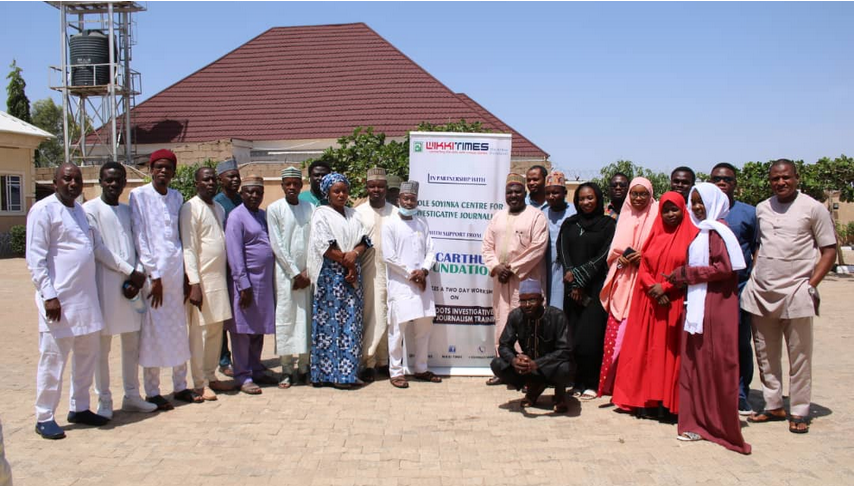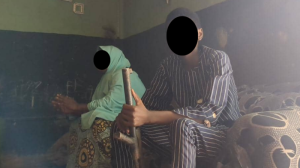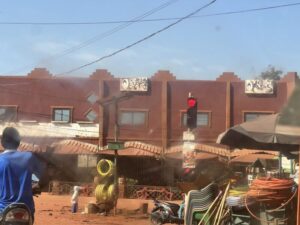By Afeez Rabiu
Professors Farooq Kperogi and Umaru Pate, along with a bilingual investigative journalist, Peter Nkanga, Data/Science Journalists, Chikezie Omeje, Damilola Ojetunde and Habib Oladapo enlivened WikkiTimes‘ capacity building for 30 northeast journalists with their revolutionary presentations aimed at sanitizing the country’s political landscape as it relates to journalism practice and journalists’ safety.
Kperogi, a Nigerian-American professor, author, media scholar and newspaper columnist, during a session on the first day of the training, harped on how journalists can investigate politically exposed individuals using multisource techniques with a structural use of facts and figures.
The erudite scholar referenced the U.S journalism model of muckraking, which he explained as diving deep into exposing misdemeanours in society.
Citing the U.S Watergate scandal, Kperogi explained that investigative journalists require a level of diligence and must be selective in consulting sources. At least, four sources could avail one with relevant information, according to him.
“Keep the outrage in sight considering the impact the issue has on the society,” Kperogi said. “Use people to tell your story and don’t use too many numbers in one place.”
Nkanga, a French and English speaking investigative journalist who was a West Africa representative of the Committee to Protect Journalists (CPJ) spoke on ‘Cyberstalking, Safety and Security of Journalists.’
He recounted the death threats and trauma that trailed an anti-human rights BBC documentary he filmed featuring Ahmed Isah, the host of Brekete Family program on Human Rights Radio in Abuja.
Nkanga in the documentary revealed Isah’s misconduct, for which he later apologised. But he would later accuse Nkanga and the BBC team of plotting to kill him, saying, “they had planned a specific spot where they would stage what looked like an attack on our vehicle and there they would eliminate me.”
Following Isah’s allegation, Nkanga’s contacts were leaked to the public and the outcome? Death threats. Trauma. And more.
Nkanga’s face rebirthed the grief he had encountered when he reached out to one of his colleagues in the diaspora during the period.
“Peter! You are on your own. That was what he told me,” Nkanga said. His countenance tells it all.
For him, the Nigeria Union of Journalists (NUJ) needs to support investigative journalists, particularly to ensure their safety and security.
“We need to have leaders in the NUJ that will have the interest of journalists at heart, there is no other union that should be more concerned with us than the NUJ,” Nkanga said, adding that journalists, too, would be motivated to participate in NUJ activities.
Professor of media history, Umaru Pate, before suggesting a solution to loopholes in Nigerian journalism, also discussed the safety and security of journalists, especially in the investigative realm and the role of NUJ.
He said: “Safety is extremely important for all professions, not only journalists, but for us, we are more concerned because of the nature of our job and responsibility.”
“Corruption and poverty can suppress the spirit of a journalist,” Pate said. “We must train our journalists on issues of safety, for them to have good safety measures, good relationship with their management, psychological safety, physical safety and also economic safety.”
While addressing the participants and the NUJ executives in the training, Pate suggested that the union should find other means of funding its activities and not rely on the government to be able to hold power accountable when need be. “Economic independence will guarantee editorial independence in the newsroom,” he said.
Taking participants through the use of Open Source Intelligence Techniques (OSINT) in their report, Chikezie Omeje, a senior investigative and data journalist with the International Center for Investigative Reporting (ICIR), enlisted some tools that would enhance the journalists’ works.
“Never assume anything, be factual regardless of the kind of journalism you do,” Omeje cautioned the participants, noting that some of the tools he availed them with have the capacity to deface fake news.
Also, Habib Oladapo, an experienced journalist and editor, exposed journalists to using research to tell compelling, yet factual stories. Oladapo, during his second session, trained the participant on solution journalism which he explained as a new genre aimed at “solving social problems using models from insights and experts.”
A veteran data journalist, Damilola Ojetunde, spoke about how journalists can humanise figures and create visuals that summarise them. Damilola’s session was more practical as he taught the participant how to create such infographics using a combined method.
The publisher of WikkiTimes, Haruna Mohammed Salisu said the essence of the training was to equip journalists with the right knowledge and resources to do their job.
“For us at WikkiTimes, holding power to account is what we exist to do. And as journalists, we believe that when we have the right expertise, resources and partners, there is every tendency that we will collectively hold power to account by deepening our democracy and ensuring it works for every citizen”, he said.
However, some of the participants who attended the training expressed satisfaction with its conduct. “It is a great program and I have benefited so much from the highly skilled resource persons in attendance, who have taken us through a rigorous tutoring session and I hope to take all I learned back to the newsroom and improve on my practice as an investigative reporter,” said Usman Babaji, one of the participants.
Another participant, Yakub Mohammed, also gave credit to the convener of the training saying it is a great initiative and has gone a long way to help in capacity building for all that participated.
“The training has achieved its purpose as I have personally learned so much and it will definitely improve my skill in my field of practice,” Mohammed said.
WikkiTimes organised the two-day training with support from the Wole Soyinka Center for Investigative Journalism (WCIJ) and funding from the MacArthur Foundation.\
Source: WikkiTimes



